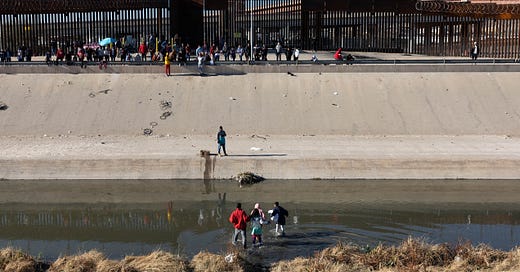
In 2022, there were over 2.76 million illegal migrant crossings at the Southwest border. That’s roughly the population of Chicago, America’s third largest city. To address this unprecedented surge, President Biden recently announced tougher restrictions and made a show of visiting the border himself.
But unlike a decade or two ago, when the immigration debate was mostly about economics, today it’s an issue that’s subsumed by the culture wars and our polarized discourse. Republican governors bus migrants to sanctuary cities and they’re called “xenophobic” and “cruel” by the left. But what happens when a Democratic governor does much the same thing, bussing migrants from Colorado to New York City and Chicago? Is it still a heartless political stunt? Or is all of this just an inevitable consequence of our broken immigration system?
So this week: a debate moderated by guest host Kmele Foster between Alex Nowrasteh and Jessica Vaughan. Are current levels of immigration helping or hurting America? How do we balance humanitarian concerns with America’s economic and security needs? Should we be trying to enforce more or less restrictions at the border? And what exactly should we do to fix our immigration policies?
Alex is the director of Economic and Social Policy Studies at the Cato Institute, a libertarian think tank. Jessica is the director of Policy Studies for the Center for Immigration Studies, a think tank that describes themselves as “pro-immigrant but low immigration.”
While Alex and Jessica couldn’t be more opposite in their approach—Alex favors free immigration, while Jessica argues for restrictionist policies—in this episode of Honestly we look for common ground, debate the facts, and search for solutions.




Does someone who enters the United States without clearing customs and receiving permission to enter, does such a person commit a crime? Should people who commit crimes have consequences? If the crime involves entering a sovereign country without permission, wouldn't the logical consequence be to be removed from that country? Whether enforcing laws is difficult or not, shouldn't we all agree about what constitutes a crime and what doesn't? Shouldn't we seek to enforce laws that are "on the books?"
What kind of thinking makes it more complicated than this?
It has been unfortunate to see the immigration issue become such a pervasive problem to which so very few want to approach with common sense and the desire to fix a very real problem in a credible way. The back and forth between the Right and Left, with one side engaging in histrionic and the other refusing to acknowledge there's even a problem, is allowing the problem to compound itself.